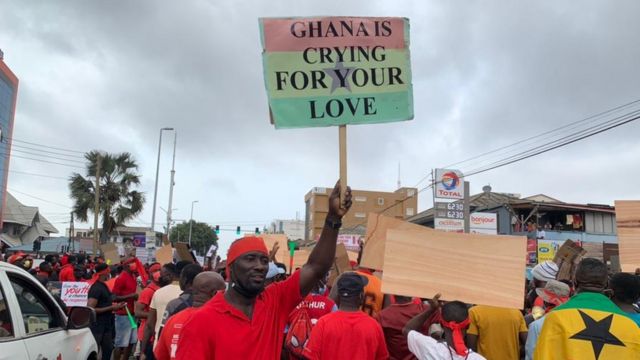Thousands of Ghanaians descended on the streets of the capital Accra on Wednesday, demanding President Nana Akufo-Addo’s administration do more to create jobs for the youth, bring down the cost of living and improve healthcare and education standards.
The demonstrations, peaceful in nature, were held under the slogan #FixTheCountry. Youthful protesters dressed in red and black chanted patriotic songs as they waved placards declaring “corruption breeds poverty” and “fix our education system now.”
Since May, Ghanaians have constantly expressed outrage on social media platforms over their economic conditions, and according to the World Bank, they are right. Last year, a report by the Washington-based lender found that the West African country was faced with 12% youth unemployment and more than 50% underemployment, higher than sub-Saharan African averages.
Ghana is the continent’s top gold producer and its government is planning to issue green and social bonds of up to $2 billion by November, which would make it the first African country to sell debt to fund development programs. In the Western power circles, it’s often applauded as one of the stable democracies in a region rife with political strife and religious violence.
President Akufo-Addo won re-election in December with only a small majority in parliament. The nation’s ratio of debt to gross domestic product surged to 77% by the end of June, and the 2020 budget deficit reached 11.7%, more than double the legal cap.
With the economy hit hard by the pandemic, the government has introduced new taxes and high fuel prices have also hiked the cost of some basic goods and services. “Nana Akufo-Addo, we’re suffering. Do something for us. Nothing is working,” said 28-year-old protester Frederick Koomson. “The government must wake up.”
Led by social media activists, the #FixTheCountry protest on Twitter has been highlighting economic problems and government management. “If the political authorities will not fix this country, we want to tell them that we are capable of destroying their career because we brought them to power,” said Fatima Mensah, a 35-year-old activist.
While the pandemic has worsened the economic conditions, some government decisions have been bizarre at best, and provocative to the suffering masses.
President Akufo-Addo recently introduced a project to construct a new $200 million national cathedral, a pledge he says he made after his 2016 election victory. Ghanaians have been asked to make a voluntary $16 monthly donation to help finish it by 2024.
“Why do we waste time on unnecessary ventures and leave the most important issues?” asked Aboagye Dacosta, a shoe shiner.
Last month, authorities cracked down on protestors in the central town of Ejura, triggering an official inquiry. This latest protest, which was initially scheduled for May 9, was blocked by the police citing concerns over the potential nonobservance of COVID-19 safety protocols.
The ban was lifted after organizers challenged the decision in court and reached an agreement with authorities on precautions.

